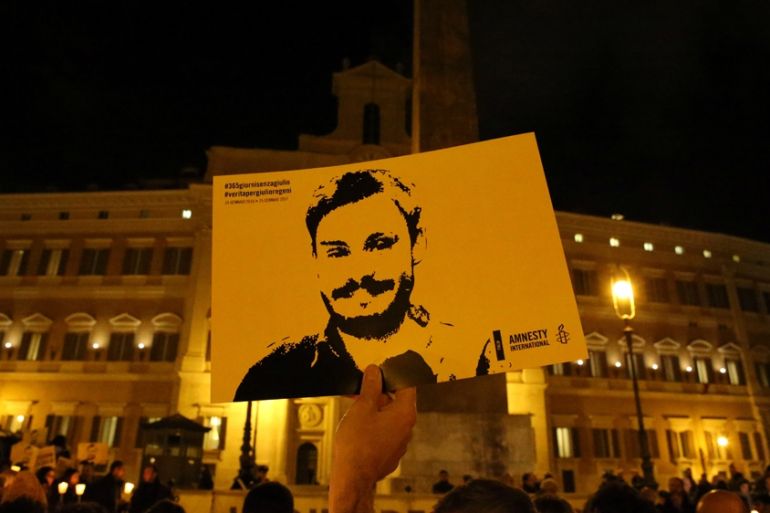Regeni’s parents demand Italy again recall Cairo envoy: Report
Parents of murdered Italian doctoral student demand withdrawal of ambassador, accusing Egypt of intimidating legal team.

The family of Italian doctoral student Giulio Regeni, who was murdered in Egypt in 2016, has demanded that Italy recall its ambassador to Egypt for a second time over what they allege as Cairo’s intimidation of their legal team.
“Enough is enough,” the Guardian reported quoting his parents Paola and Claudio Regeni as saying in a joint statement with their lawyer Alessandra Ballerini on Thursday. “The withdrawal of the Italian ambassador from Cairo can no longer be postponed.”
Keep reading
list of 4 itemsAustralia’s counterterrorism team arrests seven teens in overnight raids
‘Battlelines’ drawn as jury hears opening remarks in Trump hush money case
Two Mexican mayoral contenders found dead on same day
Italy had recalled its ambassador to Egypt in April 2016 in protest against what it said was a lack of progress in the investigation into the murder of the Italian student.
|
|
The 28-year-old PhD student was killed in Cairo in January 2016. His brutalised body, which bore signs of torture, was found lying next to a military blanket in a ditch along a highway between Cairo and Alexandria 10 days after he disappeared.
Italy’s ambassador to Egypt returned to Cairo in August 2017 in an effort to “reinforce judicial cooperation and as a consequence the search for the truth”, the then Foreign Minister Angelino Alfano had said in a statement at the time.
Regeni’s parents condemned the move, saying it would remove pressure on Egypt to hold someone accountable for the murder.
Despite months of cooperation between Egyptian and Italian prosecutors since the ambassador’s return, no arrest has been made nor any suspect charged for the killing.
‘Systematic intimidation’
Several members of Regeni’s parents’ legal team in the Cairo-based Egyptian Commission for Rights and Freedoms (ECRF) have been harassed and intimidated by the Egyptian authorities, reported the Guardian.
The commission tracks forced disappearances and has acted as a legal counsel for the Regeni family.
According to it, ECRF researcher Ibrahim Ezz El Din was forcibly disappeared earlier this month, while another ECRF employee, Maha Ahmed, is under investigation and risks imprisonment.
Mohammed Lotfy, executive director of ECRF, told the Guardian that he believed the Egyptian authorities were trying to prevent them from working on the case.
|
|
“I think the message is clear: take your hands off the case or else you’ll get hurt,” said Lotfy, adding that Ahmed’s husband Mohammed Helw was one of the ECRF lawyers granted power of attorney by the Regeni family.
He said Ahmed was facing a similar fate to that of his wife Amal Fathy, who was detained after she posted a video on social media criticising the government for failing to protect women against sexual harassment.
“With Maha, they are repeating the same scenario as Amal Fathy,” Lotfy told the Guardian.
Lotfy believes the Egyptian authorities fear that Regeni’s case could reveal the widespread use of forced disappearances in the country. The ECRF documented 230 cases of forced disappearances between August 2017 and September 2018.
“The authorities say there are no enforced disappearances in Egypt,” Lotfy told the Guardian. “Yet while we are working on the case of a forcibly disappeared Italian researcher, they forcibly disappear one of our staff members working on one of the most important cases.”
“They’re unafraid of public opinion. They want the world to believe what cannot be believed,” he said.
On Thursday, in a show of solidarity with Regeni’s parents, president of the Italian parliament Roberto Fico said in a statement on Facebook that the case will be discussed on the level of the European Union.
“Giulio’s parents will not be alone. Next week we will talk about Giulio with the German Bundestag: Giulio was not in fact just an Italian researcher, but a European one. It is a matter that concerns and must concern all the countries of the union.”
Regeni, who had been looking into Egypt’s independent unions for his doctorate thesis at Cambridge, attracted the suspicion of the Egyptian government before his disappearance, Reuters news agency reported in 2016.
Security and intelligence sources told Reuters that Regeni had been arrested in Cairo on January 25, 2016, and taken into custody. Egyptian officials have denied any involvement in Regeni’s death.
Regeni disappeared on a day Cairo police were on a tense watch for protests on the fifth anniversary of the 2011 popular uprising.
After his body was discovered, Egyptian authorities offered various explanations, including an assertion that Regeni had been hit by a vehicle. Later, they said he was a victim of a robbery.
An Italian autopsy showed that Regeni’s body was covered with cuts and his bones were broken, indicating he had been hit with “fists, batons and hammers”.
|
|